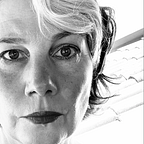Snake/Charm
When beauty fades, make friends with snakes
I never believed I was beautiful until it was over. Until I had gained 15 pounds, or 12 gray hairs, or 4 fine new lines at the crinkles of my eyes.
I never believed until I looked back from a different decade and saw the woman who had once stared me in the mirror.
“Oh,” I sigh, “look how cute my hair was then. Look how thin my legs were, how firm my chin, how buoyant my breasts!”
And then I look down, at the flesh sack I currently haul around, and lament, “And look at me now.”
It is so rare to appreciate something so fleeting while you still possess it. It might even be against the rules.
“If you’ve got it, flaunt it,” the saying goes. But if you flaunt it too hard, for too long, and with too much enthusiasm, you’ve no longer got the elusive “it.” You have become something other: a skank, a disgrace, a joke.
Women are, always, required to exist as a contradiction. We are expected to put in all the effort to maintain the required standard of beauty — shave and pluck and wax and polish and straighten and curl and diet and tuck and mince and preen — and yet somehow remain natural. Make it look effortless. As if we wake up with fresh breath and falsies, every day.
We should want dick, but not in any obvious way. Our own libido must be demure and freshly douched. A lady in the living room, a whore in the bedroom.
We should be educated, but not overly. Talented, but not intimidating. Funny, but not devastatingly so. Interesting, but not thought-provoking. Liberated, but still prone to making sandwiches.
Even when you know all the ways in which the game is rigged, even when you decide to stop playing, you can’t opt out altogether.
At age 103, my husband’s grandmother, ensconced in her wheelchair, bemoaned her body. “This chair is making me FAT,” she sighed. “I’ve got to get up and get moving or I’ll never have another boyfriend!”
My friend Ess, who was breaking hearts by the time she was 13, warned me from the other side of 50 of the trap of invisibility.
“All my life, I felt my looks were a burden,” she confessed. “I mean, I used them to get what I wanted, don’t get me wrong. But it was always so exhausting to have men flapping after me everywhere I went. I thought I’d be so happy, so fucking relieved, to be invisible.”
She makes no effort anymore, she tells me. No makeup, no hair dye, no weight loss attempts. When she must go out into the world, she yanks a nondescript hoodie from her closet — sized two times larger than she needs — pulls on her boots, lights a cigarette and stomps her way down High Street.
Everything about her says she doesn’t care what you think; she doesn’t need your approval or your eyeballs.
“But when they don’t look, I notice,” she tells me, and she’s mystified.
“It’s like I can feel the lack of attention. Like it was this light on me, or this heat, all my life. And now I’m just out in the cold. It’s like I don’t exist!”
I think of Medusa, then. (I think of Medusa often.)
I think of how she was cursed not just with the scalp full of snakes, but with ugliness. The gods thought they punished her when they stripped her of her beauty. But her beauty caused nothing but harm. Her ugliness, however, was a weapon. A purpose. A calling.
We remember her name not just because of her curse, but because of what she did with it, turning her enemies to stone. Medusa was feared and fearsome. She was better than beautiful, better than visible. She was powerful. She was memorable.
I have sometimes been beautiful. I know what it feels like: the glitter and shine of attention, the dopamine hit of approval from both my mirror and perfect strangers on the street. I don’t know if I will ever break free, or if I will still judge some measure of my worth by the numbers on the scale when I’m two steps away from the grave.
Did Medusa mourn the loss of her long soft curls, or did she make friends with the snakes?
The snakes served her better, in the end.
And so, perhaps, will my wrinkles.
About this essay:
I wrote this piece in response to a writing exercise. The instructions were:
1. Go to a book you love.
2. Find a short line that strikes you.
3. Make that line the title of your writing.
4. Write a piece inspired by the line.
5. Change the title.
The book I chose was Women and Other Monsters by Jess Zimmerman (So good! You should absolutely buy it, read it, underline your favorite passages). The quote, from page 16, was:
“Beauty had not protected her; ugliness was her armor and her blade.”
